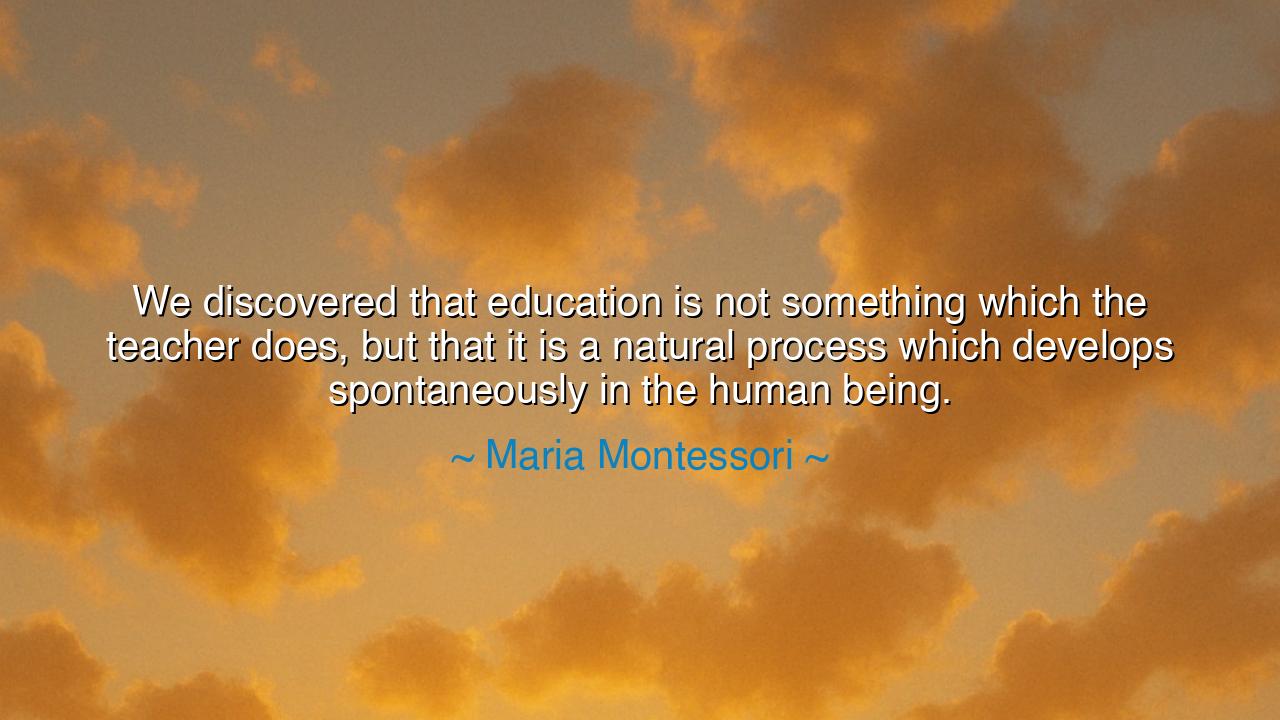
We discovered that education is not something which the teacher
We discovered that education is not something which the teacher does, but that it is a natural process which develops spontaneously in the human being.






The luminous educator Maria Montessori, whose name has become synonymous with the awakening of the human spirit through learning, once said: “We discovered that education is not something which the teacher does, but that it is a natural process which develops spontaneously in the human being.” In these words lies a revelation that shook the foundations of traditional schooling. Montessori saw education not as an act of pouring knowledge into empty vessels, but as the unfolding of a divine seed already present within each child. To her, the teacher was not the sculptor but the gardener — the one who tends, nourishes, and provides light, while the living essence of growth arises from within.
Her insight was born not in theory, but in observation. Maria Montessori, trained as Italy’s first female physician, began her journey not in grand academies but in a home for poor and developmentally challenged children in Rome. There, she made a discovery that would echo through centuries: when children are given freedom within structure — tools suited to their development, order without oppression, and respect for their individuality — they learn naturally, joyfully, and deeply. Learning, she saw, was spontaneous, not forced; it was the natural flowering of curiosity. Education, then, was not the teacher’s imposition, but the child’s own awakening.
This idea recalls the wisdom of the ancients. In Plato’s philosophy, the teacher was not a teller of facts but a midwife of the soul, helping knowledge to be born from within. The great philosopher believed that truth already lies in every person; education is merely the act of remembering — the process of bringing light to what is already hidden inside. Montessori, in her own time, brought this truth from the realm of theory into the living classroom. She showed that every child carries within them an inner guide, a quiet intelligence that seeks order, mastery, and beauty. The role of the teacher, therefore, is to listen to that inner rhythm, not to overpower it.
The results of her discovery were profound. In classrooms where traditional methods failed, Montessori’s approach transformed chaos into harmony. Children who had been labeled as “uneducable” began to read, write, and calculate with joy and precision. They became self-disciplined without punishment, cooperative without compulsion. Their faces, once dull from boredom or fear, began to shine with purpose. This was not magic, but the natural outcome of respecting the child’s innate drive to learn. Her work proved that education is not a mechanical process imposed from without, but a living flame that grows from within — if only we protect it from the winds of haste and control.
This understanding carries a message for all times: that the human being is born not to be filled, but to unfold. The teacher’s greatest act of wisdom is restraint — to know when to step back, when to allow silence, when to let the child’s own curiosity lead the way. In a world obsessed with results and measurement, Montessori’s words remind us that true education is not about conformity, but growth. The measure of success is not how much a child remembers, but how deeply they love to learn. For once the heart of curiosity is kindled, knowledge will flow like a river that never runs dry.
Her teaching also warns against the arrogance of the adult world — the belief that wisdom is given only by authority. Children, she taught, are the builders of humanity. Within their spontaneity lies the blueprint of civilization’s future. To stifle their natural process is to weaken the foundations of progress itself. The wise educator, therefore, must approach each child not as a blank slate, but as a mystery unfolding — with reverence, patience, and trust. For education, as Montessori discovered, is not the making of a person, but the unveiling of the soul.
The lesson of this great truth is as clear as it is humbling: nurture, do not dominate. In every child, there is a light that seeks to grow toward wisdom; your task, whether as teacher, parent, or mentor, is only to make room for that light. Provide structure, but never suffocate; offer guidance, but never control. For when you respect the natural process of growth, you do not merely educate — you liberate.
And so, let this wisdom be carried forward: education is not an art of teaching, but an act of faith — faith in the power of life to learn, to evolve, to seek its own perfection. As Maria Montessori revealed to the world, when the teacher ceases to be the master and becomes instead the servant of growth, then the classroom becomes a temple — and learning becomes the most sacred expression of human freedom.






AAdministratorAdministrator
Welcome, honored guests. Please leave a comment, we will respond soon